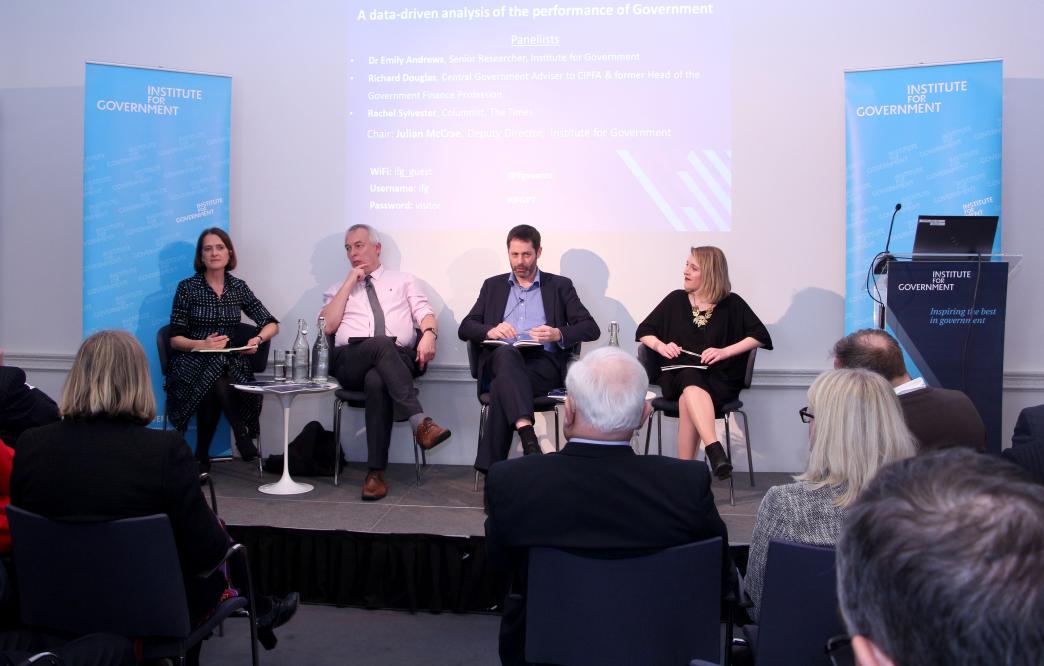Our new Performance Tracker report gives our verdict on government’s performance over the last seven years. But, as we say in the report, this is only the starting point. Improving performance means using knowledge of the past and present to make better decisions. At our public launch event, panellists and the audience turned their thoughts to the future. Dr Emily Andrews highlights the key points.

The radical changes will be saved for the next Budget
Our report clearly outlines the big pressures in public services that are facing the Chancellor right now: delayed transfers of care, prison violence and hospital waiting times to name just a few. But our panellists agree that, in this Budget, we should not expect any spectacular changes to Government policy: at most, we may see some short-term injections of cash to ‘keep the show on the road’.
However, as Rachel Sylvester, The Times columnist, puts it, we should not mistake Philip Hammond’s seemingly “straight and suity” demeanour for an unwillingness to make big changes; underneath it lies ‘radical instincts’. Julian McCrae, IfG Deputy Director, perceives a ‘seriousness’ in both the Chancellor and the Prime Minister that suggests they may be willing to make the big reforms needed to ensure the long-term stability of public services.
Government must face the political challenge of tackling big reform
Those reforms are likely to be politically challenging. The fear of ‘soft on crime’ headlines deters Governments of all stripes from sentencing reform. And the current administration is facing charges of hypocrisy, after reports that they are considering a post-mortem asset tax to pay for social care (labelled a ‘death tax’ by the Conservatives in the run-up to the 2010 election, when Labour tried to get cross-party agreement on the issue).
Again, there are signs that this administration may be willing to take a tougher stance than might be expected. Prior to last week’s Copeland by-election, one Cabinet minister told Sylvester that it would be a ‘triumph’ if the Government managed to get to the end of the race without promising to save a local maternity ward. In the end, the election was won with no such promise.
But at a national level, the panellists and the audience agree that a robust public conversation is needed, particularly about the choices and trade-offs involved in meeting the challenge of demographic ageing.
The political conversation needs a reliable set of figures underneath it
These challenging conversations are more difficult to hold in an atmosphere of so-called ‘post-truth’, argued Ann Beasley, former Director General of Finance at the Ministry of Justice, from the floor. Performance Tracker is designed in part to tackle these problems, by providing a ‘single set of figures’ as a basis for decision-making. Yet Richard Douglas, former Head of the Government Finance Profession and co-author of the report, spoke of the particular difficulty we had in pulling together a consistent time-series of government spending in different services.
This is the crux of the problem: it is not deliberate and malicious obfuscation which poses the most immediate danger here, but the accumulation of multiple small, optimism-infused decisions which build up over time.
Spending review exercises, Richard explained, always begin with a sober examination of the facts. But as political pressure mounts and the settlement date looms, officials start to look for small adjustments to the assumptions in their spreadsheets to make the numbers add up. Individually, all of them are intellectually justifiable, but collectively they amount to a ‘level of optimism [which] is unsustainable in the long term’.
This is why Performance Tracker’s call for transparency in the assumptions which underpin Government’s spending decisions, and independent scrutiny of those assumptions, is so vital. The public needs to be able to trust that the Government’s claims about what they can achieve are reliable. And organisations like the IfG, and Parliament, need the right information to hold government to account.
Read our Performance Tracker report
- Supporting document
- Performance Tracker final web.pdf (PDF, 976.99 KB)
- Topic
- Public services